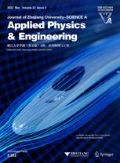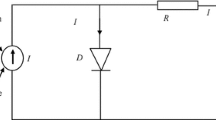Abstract
The control objective and several key parameters of PEMFC hybrid system are analyzed. Control strategy design and energy optimization simulation are made individually for given cycle case and realtime operating case. For the given cycle case, genetic algorithm is adopted to solve the multi-constraint combinatorial optimization problem. Simulation result showed the algorithm’s feasibility. As far as the realtime operation is concerned, based on the original fuzzy control strategy, the fuel cell voltage and voltage variance parameters are introduced to apply two-level modification on the fuzzy control output. The result reveals that the improved fuzzy control strategy can enhance the fuel cell efficiency and reduce the power fluctuations.
Similar content being viewed by others
References
Barili, A., Cersea, M., Parisi, C., 1995. Energy-saving Motion Control for an Autonomous Mobile Robot. Proceedings of the IEEE International Symposium, Pavia, Italy, 2:674–676.
Gao, Y., Ehsani, M., 2001. Systematic Design of Fuel Cell Powered Hybrid Vehicle Drive Train. Electric Machines and Drives Conference, IEMDC 2001, Cambridge, America, p.604–611. [doi:10.1109/IEMDC.2001.939375]
Haugen, L.B., Ayers, P.D., 2003. Vehicle movement patterns and vegetative impacts during military training exercises. Journal of Terramechanics, 40(2):83–95. [doi:10.1016/j.jterra.2003.09.004]
Iqbal, M.T., 2003. Modelling and control of a wind fuel cell hybrid energy system. Renewable Energy, 28(2):223–237. [doi:10.1016/S0960-1481(02)00016-2]
Lee, H.S., Jeong, K.S., Oh, B.S., 2003. An experimental study of controlling strategies and drive forces for hydrogen fuel cell hybrid vehicles. International Journal of Hydrogen Energy, 28(2):215–222. [doi:10.1016/S0360-3199(02)00038-1]
Markel, T., Brooker, A., Hendricks, T., Johnson, V., Kelly, K., Kramer, B., O’Keefe, M., Sprik, S., Wipke, K., 2002. ADVISOR: a systems analysis tool for advanced vehicle modelling. Journal of Power Sources, 110(2):255–266. [doi:10.1016/S0378-7753(02)00189-1]
Nasiri, A., Rimmalapudi, V.S., 2004. Active Control of a Hybrid Fuel Cell-battery System. Power Electronics and Motion Control Conference, IPEMC 2004, Xi’an, China, 2:491–496.
van Mierlo, J., van den Bossche, P., Maggetto, G., 2004. Models of energy sources for EV and HEV: fuel cells, batteries, ultracapacitors, flywheels and engine-generators. Journal of Power Sources, 128(1):76–89. [doi:10.1016/j.jpowsour.2003.09.048]
Wipke, K., Markel, T., Nelson, D., 2001. Optimizing Energy Management Strategy and Degree of Hybridization for a Hydrogen Fuel Cell SUV. http://www.ctts.nrel.gov/analysis/.
Author information
Authors and Affiliations
Additional information
Project (No. 2003AA517020) supported by the Hi-Tech Research and Development Program (863) of China
Rights and permissions
About this article
Cite this article
Liu, Cz., Zhu, Xj. Simulation and analysis of energy optimization for PEMFC hybrid system. J. Zhejiang Univ. - Sci. A 7, 1878–1885 (2006). https://doi.org/10.1631/jzus.2006.A1878
Received:
Accepted:
Published:
Issue Date:
DOI: https://doi.org/10.1631/jzus.2006.A1878



